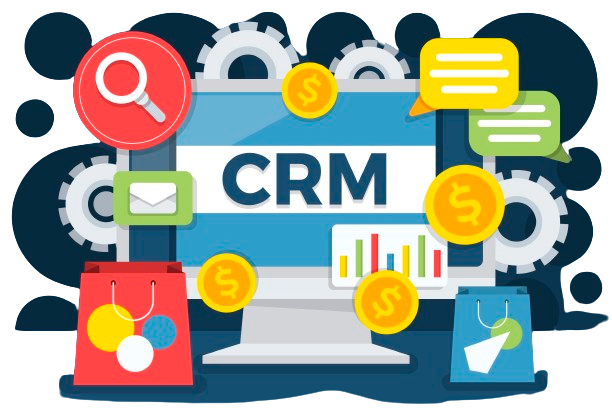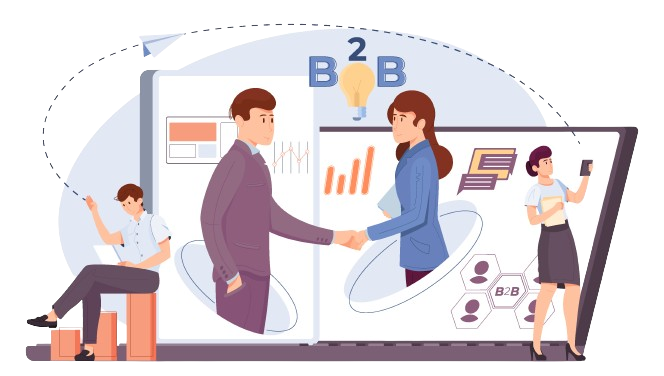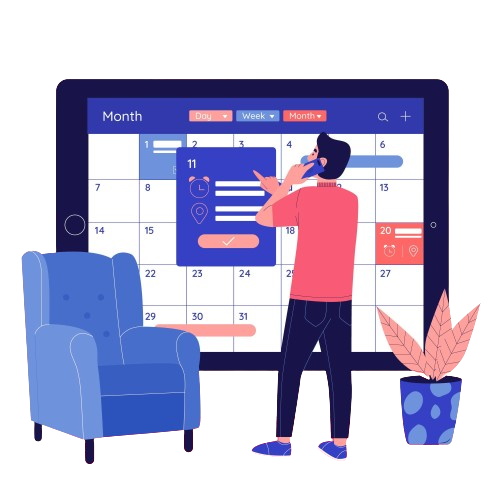
Welcome to a world where business strategies are evolving at a rapid pace, and the key to sales excellence lies in harnessing the potential of cutting-edge CRM software. In this era of digital transformation, where time is of the essence, efficiently managing lead interaction can make all the difference in achieving sales success. Did you know that businesses that effectively use CRM systems experience a 29% increase in sales revenue on average? This underscores the transformative power of CRM in shaping the sales landscape.
One of the most exciting facets of CRM that is revolutionizing lead interaction is its advanced publishing and booking features. Imagine a scenario where scheduling sales meetings becomes a seamless, automated process, allowing your team to focus on what they do best – closing deals. The integration of these sophisticated features not only saves time but also enhances the overall customer experience.
According to a recent study by Gartner, spending on CRM software is projected to reach a staggering $43 billion, indicating a widespread recognition of its value across industries. As businesses invest in CRM solutions, understanding how to leverage advanced publishing and booking features becomes paramount for staying ahead in the competitive sales landscape.
In this blog, we will dive deep into the intricacies of transforming lead interaction using the powerful publishing and booking capabilities of CRM systems. From practical tips to real-world examples, we’ll explore how businesses are achieving sales excellence by embracing these innovative features. Let’s together unlock the full potential of CRM for sales success – where every lead interaction is a step closer to achieving excellence.
Introducing the Changing World of Sales Interaction

The landscape of lead interaction is constantly evolving, driven by technological advancements and changing consumer expectations. The traditional methods of reaching out to potential clients have given way to a more sophisticated and personalized approach, demanding businesses to adapt to new strategies.
The introduction of CRM systems has been an important moment in this evolution, reshaping the way sales professionals engage with leads. Unlike the static approaches of the past, CRM introduces a dynamic and interconnected system that not only facilitates lead interaction but also transforms it into a strategic process.
Understanding Common Pain Points in Lead Interaction and Scheduling

Lead interaction and scheduling are integral components that can significantly impact the success or failure of a deal. Recognizing the pain points associated with these processes is the first step toward implementing effective solutions through CRM.
- Communication Gaps: One of the primary challenges in lead interaction is the potential for communication breakdowns. Traditional methods often rely on manual data entry and lack real-time updates, leading to missed messages, overlooked emails, and delayed responses. CRM steps in to bridge these gaps by centralizing communication, ensuring that every team member has access to the latest information about leads.
- Time Zone Coordination: In a globalized business environment, coordinating schedules across different time zones can be a logistical nightmare. Sales professionals often struggle to find suitable meeting times that accommodate both their team and potential clients. CRM’s scheduling features can automate this process, considering time zone differences and suggesting optimal meeting slots, thereby minimizing scheduling conflicts.
- Lead Tracking and Prioritization: Without a systematic approach to lead tracking, sales teams may struggle to prioritize their efforts effectively. CRM provides a centralized platform for lead management, allowing sales professionals to track interactions, gauge lead interest, and prioritize follow-ups based on real-time data. This ensures that high-potential leads are not overlooked.
- Inconsistent Follow-Up: Establishing consistent follow-up procedures is crucial for nurturing leads through the sales pipeline. Inconsistencies in follow-up can result in missed opportunities and potential client dissatisfaction. CRM’s automation capabilities enable sales teams to set up personalized follow-up sequences, ensuring that leads receive timely and relevant communications at every stage of the sales journey.
- Manual Data Entry Errors: Tedious manual data entry not only consumes valuable time but also introduces the risk of errors. Incorrectly recorded contact details, meeting times, or lead statuses can lead to confusion and undermine the credibility of the sales process. CRM automates data entry, reducing the likelihood of errors and ensuring that information is accurately captured and updated.
- Lack of Historical Context: Understanding a lead’s history and past interactions is crucial for personalized and effective communication. Traditional systems may lack the ability to provide a comprehensive historical context, making it challenging for sales professionals to tailor their approach. CRM consolidates all relevant data, offering a holistic view of a lead’s journey and enabling more informed and personalized interactions.
By comprehensively addressing these common pain points in lead interaction and scheduling, CRM emerges as a transformative tool that not only streamlines processes but also enhances the overall effectiveness of sales teams.
A Comprehensive Overview of Advanced Features of CRM Systems

CRM systems have evolved far beyond their initial role as digital Rolodexes. Today, they stand as powerful tools that can transform how businesses interact with leads, especially when it comes to advanced features designed to enhance the sales process.
- Unified Customer Database: One of the fundamental strengths of CRM lies in its ability to consolidate customer data into a single, accessible repository. From contact information and communication history to preferences and purchase patterns, a unified customer database allows sales professionals to have a holistic view of their leads. This not only facilitates more personalized interactions but also streamlines the lead nurturing process.
- Intelligent Lead Scoring: CRM’s advanced features include intelligent lead scoring mechanisms. By leveraging algorithms and predefined criteria, the system assigns scores to leads based on their behavior, engagement level, and other relevant factors. This ensures that sales teams prioritize their efforts on leads that are more likely to convert, leading to increased efficiency and higher conversion rates.
- Automated Workflows: CRM systems excel in automating repetitive tasks, allowing sales professionals to focus on more strategic activities. Advanced automation features enable the creation of customized workflows that guide leads through the sales funnel. From sending targeted emails to scheduling follow-up calls, automation ensures a consistent and timely engagement process, enhancing the overall customer experience.
- Dynamic Content Publishing: The integration of advanced publishing features within CRM platforms empowers sales teams to create and share dynamic content. Whether it’s personalized email campaigns, engaging social media posts, or informative blog content, CRM enables the seamless creation and distribution of materials tailored to specific leads. This not only helps in capturing attention but also positions the brand as an authority in the industry.
- Predictive Analytics: Harnessing the power of predictive analytics, CRM systems can provide valuable insights into future trends and customer behavior. By analyzing historical data, the system can make predictions about which leads are more likely to convert, allowing sales teams to proactively tailor their strategies. This forward-looking approach significantly contributes to more informed decision-making and improved sales outcomes.
- Seamless Integration with Booking Systems: CRM’s advanced features extend to seamless integration with booking management CRM systems. This ensures that the scheduling of sales meetings and appointments becomes a hassle-free process. Sales professionals can efficiently manage their calendars, share availability with leads, and even automate appointment confirmations, enhancing the overall efficiency of the sales cycle.
Thus, the power of CRM lies in its advanced features, which collectively redefine how businesses interact with leads. From intelligent automation to dynamic content publishing and predictive analytics, CRM systems offer a comprehensive toolkit for sales professionals aiming for excellence in lead interaction and conversion.
Strategic Publishing: Crafting Compelling Content to Attract and Engage Leads

The adage “content is king” holds, especially when it comes to engaging and attracting potential leads. Let’s explore how strategically leveraging CRM’s advanced publishing features can transform your approach to content creation, making it a powerful tool for lead interaction and engagement.
The Role of Compelling Content
Compelling content serves as the cornerstone of any successful lead engagement strategy. Whether it’s blog posts, articles, social media updates, or newsletters, the content you publish has the potential to captivate your audience, positioning your brand as an industry authority and attracting potential leads.
Publishing Features of CRM Systems
CRM systems come equipped with a suite of publishing tools that empower sales professionals to create, schedule, and distribute content seamlessly. From automated social media posting to email campaigns, CRM simplifies the process, allowing you to focus on the quality and relevance of your content.
- Tailoring Content to Your Audience: One of the key advantages of CRM-driven publishing is the ability to tailor content to specific segments of your audience. By analyzing data and understanding your leads’ preferences, you can create personalized content that resonates with their needs, pain points, and interests. This tailored approach significantly enhances the chances of capturing their attention and fostering meaningful engagement.
- Automation for Consistency: Consistency is vital in maintaining a strong online presence. CRM’s automation features enable you to schedule a content publication in advance, ensuring a steady flow of engaging material without manual intervention. This consistency not only saves time but also helps in building a reliable brand image.
- Monitoring Engagement Metrics: CRM systems provide robust analytics tools that allow you to track the performance of your published content. Metrics such as click-through rates, social media engagement, and email open rates offer valuable insights into what resonates with your audience. By leveraging these analytics, you can refine your content strategy and enhance its effectiveness over time.
- Integrating Publishing with Lead Interaction: The beauty of CRM is its ability to seamlessly integrate publishing with lead interaction. For example, you can automate the delivery of relevant content to leads based on their interaction history, ensuring a personalized and timely engagement that aligns with their buyer’s journey.
Best Practices for Crafting Compelling Content:
- Understand your target audience and tailor content to their needs.
- Utilize multimedia elements such as videos, infographics, and images.
- Maintain a consistent posting schedule for sustained engagement.
- Incorporate storytelling to make your content more relatable.
- A/B tests different types of content to identify what resonates best.
Strategic publishing with CRM goes beyond merely disseminating information. It becomes a dynamic tool for building relationships, establishing authority, and ultimately converting leads into valued customers.
Streamlining the Appointment Process for Sales Meetings Through Efficient Bookings Using CRM Systems

The ability to seamlessly schedule appointments can be a decisive factor in closing deals. Let’s find out how advanced booking features in CRM systems play a pivotal role in streamlining the appointment process, contributing to overall sales efficiency.
- Calendar Integration: One of the key features that make CRM systems invaluable for sales teams is the integration of calendars. Sales professionals can sync their calendars with the CRM, providing a real-time view of their availability. This eliminates the back-and-forth communication usually associated with finding suitable meeting times, allowing leads to instantly book appointments based on open slots.
- Automated Appointment Reminders: CRM systems take the hassle out of appointment management by automating reminders. Sales teams can set up automated reminders to notify both themselves and their leads about upcoming meetings. This feature ensures that appointments are not missed, reducing the likelihood of last-minute cancellations and improving overall meeting attendance.
- Customizable Booking Pages: CRM systems often offer the flexibility to create customizable booking pages. Sales professionals can personalize these pages with relevant information, branding, and even specific questions or requirements for leads to address before the meeting. This not only saves time during the actual meeting but also allows sales reps to come prepared with the necessary information.
- Multi-Time Zone Support: For sales teams dealing with leads across different time zones, CRM systems with advanced booking features often come equipped with multi-time zone support. This ensures that both parties are on the same page regarding the meeting time, mitigating the risk of scheduling errors and enhancing the overall professionalism of the interaction.
- Real-Time Availability Updates: Nothing is more frustrating for leads than attempting to book a meeting only to find out that the chosen time slot is no longer available. CRM systems address this issue by providing real-time availability updates. Sales reps can avoid double bookings, and leads can have confidence that the chosen time is indeed open.
- Effortless Rescheduling: Plans change, and flexibility is crucial in sales. CRM systems simplify the rescheduling process by allowing both sales professionals and leads to easily adjust meeting times without the need for extensive back-and-forth communication. This adaptability ensures that valuable sales opportunities are not lost due to scheduling conflicts.
The efficient booking capabilities within CRM systems empower sales teams to focus on what they do best—building relationships and closing deals—while the technology takes care of the logistical aspects. This not only saves time but also enhances the overall customer experience, contributing to a more streamlined and effective sales process.
How CRM Seamlessly Connects Publishing and Booking?
In sales, where timely and effective communication is paramount, CRM systems have emerged as powerful tools that go beyond mere contact management. One of the key aspects where CRM truly shines is in seamlessly connecting the realms of publishing and booking, creating a harmonious and efficient workflow for sales teams.
- Unified Data Ecosystem: CRM serves as the centralized hub for all customer-related data, allowing sales teams to access a unified view of customer information. This unified data ecosystem ensures that information gathered during the lead nurturing and publishing phase seamlessly integrates with the booking process. No more siloed data or disjointed processes – CRM ensures a smooth transition from engaging content to scheduled appointments.
- Automated Publishing and Scheduling: Gone are the days of manual publishing and scheduling. With advanced CRM systems, sales teams can automate the publication of content across various channels, from social media to email campaigns. Simultaneously, the CRM’s booking features automate the scheduling process, allowing leads to effortlessly select suitable time slots for sales meetings. This automation not only saves time but also minimizes the risk of errors, ensuring a consistent and reliable process.
- Real-Time Collaboration: Imagine a scenario where a lead interacts with a published piece of content and expresses interest in a sales meeting. CRM facilitates real-time collaboration by instantly notifying the relevant team members. This ensures that everyone is on the same page, reducing response times and enhancing the overall customer experience. Seamless integration allows for a more agile and responsive approach to lead interaction.
- Personalization at Scale: CRM systems leverage data analytics to provide valuable insights into lead preferences and behaviors. This information can be utilized to personalize both content and booking interactions. By tailoring content based on lead preferences and suggesting optimal meeting times, sales teams can create a personalized experience at scale. This personal touch goes a long way in building strong and lasting customer relationships.
- Cross-Channel Consistency: In the interconnected digital landscape, consistency across channels is key. CRM ensures that the messaging and scheduling information presented to leads remain consistent, regardless of the channel they engage with. This cross-channel consistency reinforces brand identity and fosters a sense of reliability, crucial in establishing trust with potential customers.
- Seamless Third-Party Integrations: CRM systems are designed to be versatile and integrate seamlessly with third-party tools. Whether it’s connecting with marketing automation platforms, calendar applications, or communication tools, CRM facilitates a seamless flow of information. This not only enhances the functionality of both publishing and booking processes but also allows organizations to leverage the best tools available in the market.
The integration of publishing and booking within a CRM system is revolutionary for modern sales teams. It transforms lead interaction from a series of disjointed tasks into a cohesive and streamlined process. A well-equipped CRM empowers sales professionals to focus on what truly matters – building meaningful connections and driving business success.
Customizing CRM Features to Your Sales Workflow

Recognizing the unique needs and nuances of your sales workflow is pivotal to achieving success. This is where the customization prowess of CRM systems comes into play. In this segment, we’ll delve into the art of tailoring CRM features to align seamlessly with your sales processes, ultimately paving the way for enhanced efficiency and productivity.
The Foundation of Customization
At its core, CRM customization involves molding the system to cater specifically to your business requirements. This foundation begins with understanding the intricacies of your sales workflow — from lead generation and nurturing to the final stages of conversion. CRM platforms offer a range of customization options, allowing you to adapt the software to the unique rhythm of your sales team.
Adapting Fields and Data
One of the primary ways to customize CRM for sales success is by adapting fields and data points. Your sales team might prioritize certain information over others, and a tailored CRM system lets you define and organize data fields accordingly. This ensures that your team can quickly access and leverage the most relevant information during lead interactions and sales meetings.
Workflow Automation
Every sales team has its own set of processes and sequences that lead to successful conversions. Customizing CRM features allows you to automate these workflows, eliminating repetitive tasks and reducing the chances of errors. From automated follow-up emails to triggered alerts for specific actions, tailoring the CRM’s automation capabilities ensures a more streamlined and consistent sales process.
User Interface Tailoring
User experience plays a crucial role in the adoption and effectiveness of any CRM system. Customizing the user interface (UI) according to your team’s preferences and workflow makes the software more intuitive and user-friendly. This not only accelerates the learning curve for new users but also boosts overall productivity as your team can navigate the system effortlessly.
Reporting and Analytics Tailoring
Effective decision-making hinges on accurate and insightful data. CRM platforms offer robust reporting and analytics features, but to derive maximum benefit, these need to be aligned with your specific key performance indicators (KPIs). Customizing reports and dashboards ensures that your team receives real-time insights tailored to the metrics that matter most for your sales goals.
Scalability and Future-Proofing
As your business grows, so do your sales requirements. An adeptly customized CRM system is scalable, adapting to the changing needs of your sales workflow over time. Future-proofing your CRM through customization ensures that it remains a valuable asset as your team and business evolve.
Best Practices for Customization
While customization holds immense potential, it’s essential to approach it with a strategic mindset. Consider conducting regular reviews of your sales processes, seeking feedback from your team, and staying informed about updates and new features offered by your CRM provider.
Therefore, customization is the key to unlocking the full potential of CRM for your sales team. By tailoring features to align with your unique workflow, you empower your team to work more efficiently, make informed decisions, and ultimately achieve sales excellence.
CONCLUSION
The journey from struggling with lead interaction to converting them into valuable opportunities is significantly transformed through CRM mastery. The integration of advanced publishing and booking management CRM opens new avenues for sales excellence.
Through the strategic use of CRM systems, businesses can now seamlessly navigate the complexities of lead management. The ability to craft compelling content for publishing and efficiently schedule sales meetings enhances not only the customer experience but also the overall efficiency of the sales process.
CRM mastery empowers organizations to tailor their approach, responding to the unique needs of each lead. This personalized engagement, coupled with data-driven insights, ensures that interactions are not just transactions but meaningful connections that lead to conversions.
By connecting the dots between publishing and booking, CRM serves as a central hub for lead interaction, fostering collaboration, and breaking down silos within the sales team. The result is a streamlined and cohesive process that maximizes the potential of every lead.
As businesses look to the future, CRM continues to evolve, promising even more advanced features and capabilities. This journey doesn’t end with the adoption of CRM; it transforms. It’s a continuous cycle of improvement, learning, and adaptation, all aimed at turning leads into opportunities. With CRM mastery, businesses not only meet the needs of today but also position themselves to thrive in tomorrow’s sales environment.